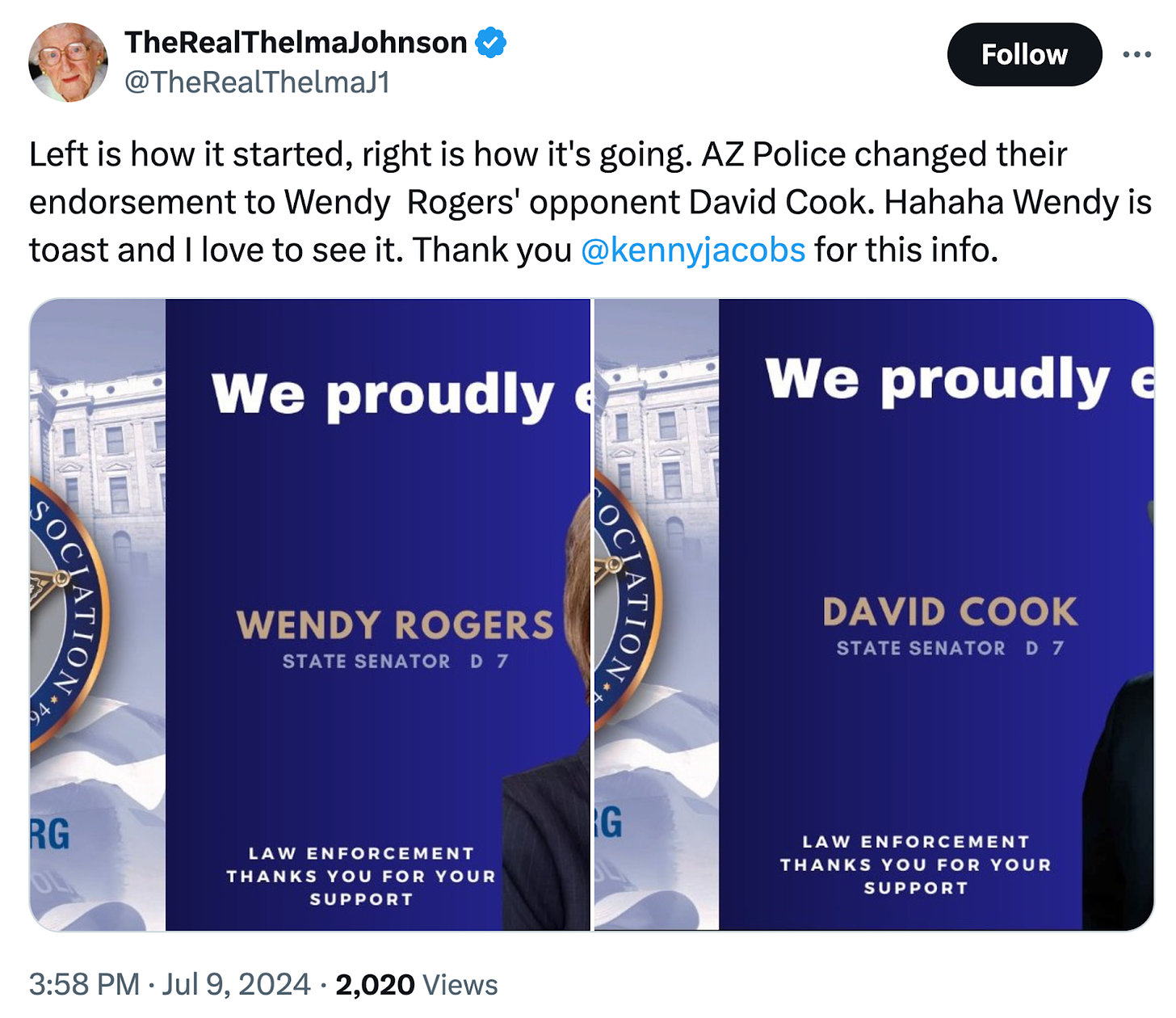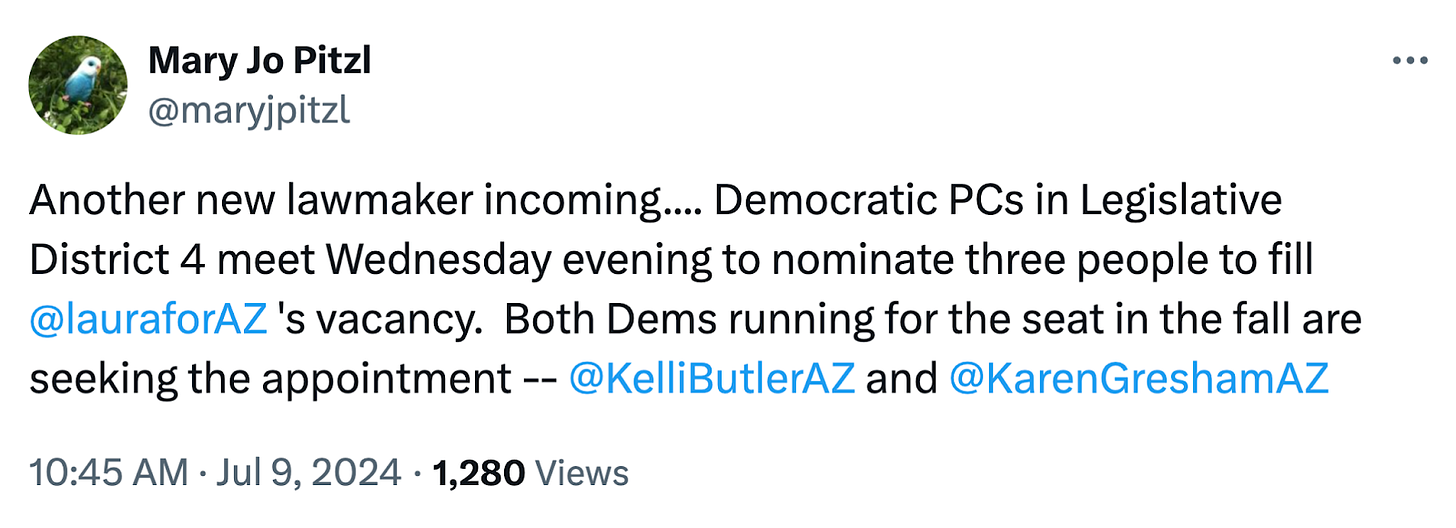The politics of propositions
A summary leaves stuff out … Wendy goes to church … And Marco’s robots are still sore.
State lawmakers met on Monday to tinker with the wording for the summaries of ballot measures that are included in the publicity pamphlet sent to every registered voter in the state.
You know, that white-pages-style book that you get in the mail just before your ballot arrives that you probably reference as you vote…
For millions of Arizona voters, the publicity pamphlet is the go-to guide to help them fill out their ballots — it includes information about judges and initiatives that aren’t as easily decided by looking for an “R” or “D” next to a name.
Those short summaries in the pamphlet are the only analysis that many people read about the more than a dozen measures they’re expected to vote on. They’re written by the nonpartisan attorneys at the Legislative Council, but then lawmakers amend the summaries to better fit their liking.
And those tiny tweaks can have a profound impact on voters’ opinions of the measures.
That’s why state law requires those summaries to be neutral, clear and concise. But politicians are often far more interested in presenting the issue in the best possible light for their position than presenting a simple summary.
And since the process is left in the hands of politicians, the summaries are always a political battle.
A few examples:
Arizona for Abortion Access: Lawmakers dueled over what to call an embryo that’s growing inside another person.1 Should it be referred to as a “fetus,” as Democrats wanted, or an “unborn human,” as Republicans preferred? Well, considering Republicans have more votes on the Legislative Council, it'll be called an unborn human in your publicity pamphlet. (Pending a planned lawsuit over whether that’s neutral enough.)
Judicial Retention: When it came to the legislative referral to decimate Arizona’s longstanding judicial retention system, the summary barely notes what many consider to be the primary intent of the proposal: the retroactive clause that would void the results of this year’s retention elections because activists are targeting Arizona Supreme Court Justices Kathryn King and Clint Bolick for supporting the territorial-era ban on abortions in Arizona. Democrats tried to amend the summary to explicitly state that the measure would be retroactive, but Republicans, including Bolick’s wife, Republican Sen. Shawnna Bolick, shot down the amendment. The analysis was adopted on a party-line vote.
Protect Tipped Workers Act: Democratic lawmakers wanted to make it more clear that this legislative referral would allow employers to pay tipped workers less than they currently must pay them. Republican lawmakers shot down several amendments to do so.
There were also dozens of smaller fights about grammar, technical terms and vernacular, including whether to call undocumented migrants “aliens” or “noncitizen.” Because it came down to a vote, “alien” won out.
The process for amending the summaries is much like a committee hearing. Lobbyists come up to the podium to argue for or against small tweaks that will benefit their clients. Lawmakers offer verbal amendments, coming up with changes on the fly that are decided just as flippantly.
And in November, millions of Arizona voters will rely on those summaries when filling out their ballots.
Birds of a feather: Republican state House candidate Ari Bradshaw has been claiming that he heard Republican candidate Steve Slaton use the N-word against Republican Rep. David Marshall, who is Black. The Mountain Daily Star got ahold of a recording of a phone call between Bradshaw and Republican Sen. Wendy Rogers in which she tries to intimidate Bradshaw into backing down from talking about it. Rogers is backing Slaton, despite many questions about his military service.
“You caught just me just before going to church. Do you realize that what you’ve posted regarding Steve Slaton is defamatory?” she asks.
“It’s not defamatory if I’ve heard him say it in front of me. I’ve heard him call Dave the N-word literally in front of me,” Bradshaw shoots back.
“Even if you think you heard what you heard, you are really playing with fire legally, politically and in all respects … I don’t think you have a clue how dangerous what you’re doing has been,” she responds.
Bad cop: Democratic Maricopa County Sheriff hopeful Tyler Kamp sexually harassed a rookie deputy when he worked at Phoenix Police Department, ABC15’s Dave Biscobing reports after digging through texts and an internal investigation into the 2020-2021 incident. Kamp retired from the office before the investigation wrapped up and was never disciplined. He was also reprimanded for using a department vehicle for personal use and suspended for improperly accessing a confidential law enforcement database.
“The texts show Kamp talking to the officer about sex, commenting on her body and appearance, telling her he was turned on, and asking her to give him a heads up the next time she was going to wear yoga pants,” Biscobing writes.
A good filing system is key: Maricopa County Recorder Stephen Richer argues one of his GOP primary challengers, state Rep. Justin Heap, is unfit for the job of being county recorder because he can’t keep his own documents in order. As the name implies, the recorder is mainly charged with recording documents, despite the election side of the job getting all the attention. Heap has been late on his campaign finance reports and submitted questionable campaign reports that were forwarded to the Attorney General’s Office for investigation, per 12News’ Joe Dana. He also got pulled over without vehicle registration, and he was cited for not having a valid license during another stop.
Now do parking lots: Farmers are putting up solar panels to provide partial shade for crops as summers get hotter for longer stretches, which helps save water, Cronkite News’ Amaia J. Gavica writes. And the extra shade isn’t a problem for plants’ growth because, according to the U.S. Department of Agriculture, “Plants don’t need really as much sun as they get here in the West.”
One ballot, many subjects: The legal challenge of HCR2060, which would make crossing the border a state crime if voters approve the ballot referral in November, commenced in a hearing at Maricopa County Superior Court Monday where attorneys for Republican lawmakers argued everything in the sweeping measure (including upping penalties for selling fentanyl) is related to smuggling, Capitol scribe Howie Fischer writes. The state constitution says state laws have to stick to single subjects, and opponents of the ballot measure say HCR2060 does not. If the judge finds the provisions aren’t covered under one subject, it won’t be up for a vote in November.
Healthy, clean and dry: AriZona Iced Tea — which actually operates out of New York and is run by Brooklyn native and billionaire Don Vultaggio — has managed to keep printing the 99 cents label on its cans by cutting down on third-party costs and the aluminum encasing the tea, the Republic’s Brenna Gauchat writes in an interesting history of the tea brand. When Vultaggio came up with his company’s name, he had never visited Arizona but said he associated the state “with a healthy, clean and dry feel.”
"People say, ‘How do you do that?’ We make it faster. We ship it better. We ship it closer. The cans are thinner," Vultaggio told TODAY in a recent interview.
Marco Lopez isn’t taking his 2022 primary election loss to Governor Katie Hobbs well.
Since her victory in 2022, the one-time mayor of Nogales, Arizona, hasn’t exactly been supportive of the governor on his Twitter account.
This week, he posted yet another dig at the governor on his blog and Linkedin (of all places) positing and answering the question of whether “the worst-rated Democratic governor in America should campaign for Joe Biden.” (Hobbs has the lowest approval ratings of any swing-state Democratic governor.)
Unsurprisingly, he declares it would be a “strategic misstep” to have Hobbs campaign with Biden.
It’s the kind of insightful political analysis he and his company, Intermestic Partners, are known for.
Remember his company, Intermestic Partners? And how Lopez wouldn’t explain why it received a $35,000 wire transfer from a Swiss bank account tied to the largest foreign bribery case in history?
And like all the blogs we reviewed on his company website — which include insights and advice about everything from the “political risks in nearshoring” to how “AI is transforming cross border trade and investments” — it’s almost certainly written by ChatGPT.
As we mentioned yesterday, we’ve seen enough GPT writing to know how to spot it. And while AI detectors aren’t foolproof, they’re through-the-roof confident that his posts are not written by a human.
That was the best phrase we could come up with that didn’t include the words “fetus” or “human.”










"Democrats tried to amend the summary to explicitly state that the measure would be retroactive, but Republicans, including Bolick’s wife, Republican Sen. Shawnna Bolick, shot down the amendment."
That's self-serving and corrupt--hiding the actual purpose of the proposition for personal benefit. The GOP is shameless.
"Rogers is backing Slaton, despite many questions about his military service."
There aren't "questions about his military service" -- he's a fabricator, falsely claiming to have been a Vietnam helicopter pilot, using falsified documents. Slaton is a fake.
On my to-do list today was figuring out which Maricopa County sheriff candidate to vote for in the dem primary. Thanks for making that job easier with the dive into the investigation against Kamp! Yuck!